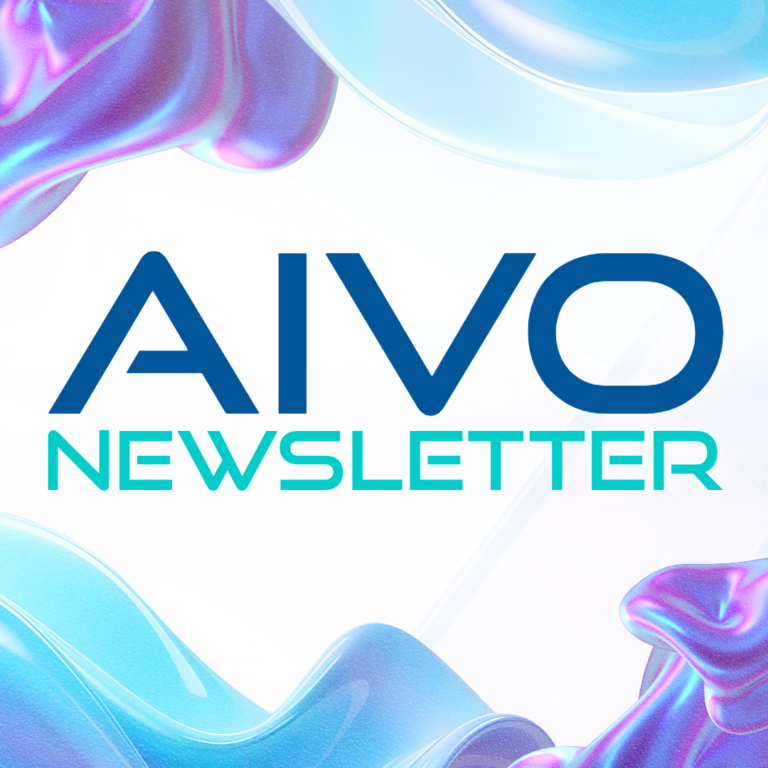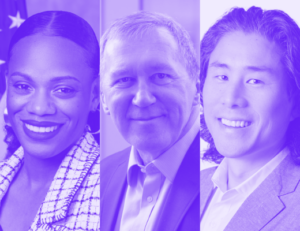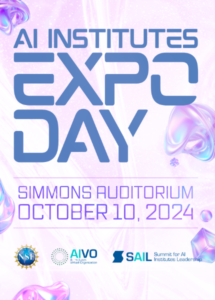Welcome to AIVO News! Our newsletter features projects, events, and opportunities within the AI Institutes Virtual Organization community.
- To subscribe, please complete the AIVO Newsletter Signup Form.
- Contact us to suggest items for an upcoming newsletter issue or to provide feedback.
October 2024 Issue
Table of Contents:
- Synergy at SAIL 2024
- AIVO Programs with Funding for Collaboration
- Happenings in SIGs
- For the AI Institutes Community
Synergy at SAIL 2024
We had a sold-out Summit for AI Institutes Leadership (SAIL) conference in Pittsburgh, PA
October 7–10! We’re delighted that so many of you were able to attend SAIL and collaborate with AI Institutes’ researchers and staff, NSF, USDA-NIFA, and their partners.
There was palpable energy at SAIL and AI Institutes Expo Day! Whether it was making connections, getting questions answered, learning best practices, sharing concerns, or hearing about showcased research, we hope your takeaways from SAIL will advance your individual AI missions as well as our collective vision for AI.
Here are some of the highlights:
Keynote Speakers
The 2024 SAIL keynote speakers (pictured below) were illuminating. We heard from:
- Summer Lee, U.S. Representative, Pennsylvania’s 12th Congressional District, who talked about the opportunities and risks stemming from AI and how politics and public perception are affected by technological developments.
- Tom Mitchell, Founders University Professor, Carnegie Mellon University, who discussed “Where Can AI Take Education by 2030.”
- Pat Yongpradit, Chief Academic Officer, Code.org, who delved into “Making the Most of this AI Moment.”
Opening Panel and SIG Workshops
Each of the five SIGS and the five education Institutes met on October 7, after the opening panel, “Institute Outreach & Communication Best Practices.” This well-attended session covered:
- The Research/Social Science Side of Public Opinion on AI
- The Process for Sharing Research Publications
- Media Coaching
- How to Write Press Releases
- Strategic Communications Plan Basics
- Best Practices in Writing Web and Social Media Copy
- Website and Social Media Best Practices
Communications Webinar Series: If you’re interested in learning more about those or any other communications topics as part of an upcoming webinar series, send your requested topics to aivo@ucdavis.edu.
AI Institutes Expo Day at Carnegie Mellon University
Expo Day was held on October 10 at Carnegie Mellon University (CMU), which is part of AI-SDM.
The day began with a showcase from 25 AI Institutes, followed by welcome remarks from Dr. Farnam Jahanian, President of Carnegie Mellon University. Dr. Farnam discussed the extraordinary opportunities that AI presents, as well as the challenges it brings. The agenda closed with two panels, “Hot Topics in AI” and “Innovations in Generative AI Research & Use-Inspired Solutions.”
Visit the agenda on the AI Institutes Expo 2024 homepage for a list of our panelists. (Click on the panel title.)
To learn more about Expo Day 2024, read the CMU story, “AI Leadership Summit Explores How AI is Transforming Life.”
AIVO Programs with Funding for Collaboration

Let’s connect and make an impact at scale with workshops and SIG events and connect internationally via the IESP! Use these links to express interest and request funding for three key AIVO expansion programs that currently have available funding.
Instructions are in the top section of each form:
Happenings in SIGs
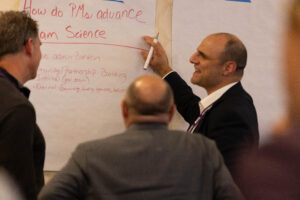
Project Management (PM) SIG Recap
A Successful SAIL 2024
The PM SIG held a productive and engaging session at the Summit for AI Institute Leadership (SAIL) on Monday, October 7. The session was divided into two parts: a sharing of successes driven by PMs and a collaborative workshop on best practices.
Sharing Successes
The first part of the session showcased the impactful work of PMs across various AI Institutes. Norman Gottron from AI-SDM presented on the development of AI tools for project management, which have significantly reduced administrative burdens for his team. Kevin Dalmeijer from AI4OPT shared insights into the successful implementation of a high-school summer camp program, highlighting its expansion to online formats and collaborations with UC Berkeley. Jessica Bell and Rudy Salcido from AIIRA provided a joint presentation on pragmatic project management, emphasizing the application of project management techniques to research group settings.
Collaborative Workshop
The second part of the session, facilitated by Divergent Science, LLC, was a collaborative workshop. Building on the foundational knowledge gained from the Fundamentals of Team Science online course and office hours, the workshop focused on transitioning from the course content to the practical application of team science principles. The group collectively selected and defined writing roles for an upcoming collaborative publication, aiming to document the collective knowledge of PMs in the Institutes.
Looking Ahead
More than 20 PMs actively participated in the workshop, contributing to the identification of key topics for the publication. These topics include the essential skillsets of a good PM, the role of PMs in advancing team science, the unique challenges and opportunities faced by PMs in scientific research, and recommendations for PIs, institutions, and funding agencies. The PM SIG is committed to collaboratively writing a high-quality article for submission to a major journal, with a target publication date of late Spring 2025.
We encourage all PMs to stay tuned for updates on the progress of the collaborative publication and future opportunities to engage with the PM SIG!
For the AI Institutes Community
ACCESS: Cyberinfrastructure Resources for AI Institutes
Have you used ACCESS? Advanced computing and data resources are available free of cost to AI Institutes via the Advanced Cyberinfrastructure Coordination Ecosystem: Services & Support (ACCESS) program, courtesy of NSF.
In fact, you don’t need to be part of an AI Institute to use ACCESS resources; And you don’t need a supporting grant from any agency to request resources.
If you’re located at an institution based in the US, and at least at graduate school level, you’re eligible to request a project. Most projects are approved in less than 24 hours and require no more than a paragraph of justification!
- Faculty, postdocs, and center research staff are eligible to lead a project.
- Graduate students are eligible to lead a project with the guidance of their advisor or PI.
Get started on your first project with step-by-step instructions.
If you’re requesting resources for work related to your AI Institute, please enter the corresponding supporting grant information in your project request.
Hardware types available through ACCESS:
- Computing systems of varying core counts and memory sizes
- Cloud resources for persistent services (web servers, databases, etc.)
- A plethora of GPU resources
- Other accelerators, such as vector processors and FPGAs
- Data storage systems (archival, object, tiered)
- Data repositories
- Software and workflow managers
Plus, hundreds of Nvidia H100s are coming online in the next few months! Explore some of the ACCESS resources available to you.
Questions? Get in contact with an ACCESS staff member via email: allocations@access-ci.org.

Comment on the NAIRR Pilot Portal
You’re invited to provide input for the National Artificial Intelligence Research Resource (NAIRR) Pilot and help build a brighter future for AI research!
NAIRR is a concept for a national infrastructure that connects U.S. researchers to computational, data, software, model, and training resources they need to participate in AI research — a vision for a shared national research infrastructure for responsible discovery and innovation in AI — that’s set to revolutionize AI research accessibility in the US.
A key part of this vision is the NAIRR Portal, a central hub connecting researchers, educators, and students with crucial AI resources. The NSF CI CoE: SGX3 – A Center of Excellence to Extend Access, Expand the Community, and Exemplify Good Practices for CI Through Science Gateways leads this effort and provides a transformative platform, the NAIRR Pilot Portal.
Please participate in the SGX3 survey, which will directly shape the design and development of the NAIRR Pilot Portal. The survey takes approximately 15 minutes, and all responses will be anonymized and reported in aggregate to NSF. Your input is invaluable in ensuring that the NAIRR Portal meets the needs of our AI community.
Take the NAIRR Pilot Portal survey.
If you’d like to stay informed about this work or receive the SGX3 newsletter, please share your email in the survey comments.
- Learn more about the NAIRR Pilot on the NSF website or on the NAIRR Pilot Portal.
- Visit the Science Gateways website for access to shared data, software, computing services, instruments, and educational materials for science and engineering communities.
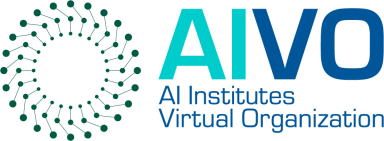
Institute Marketing Materials on the AIVO Website
Do you have a flyer or other marketing materials for your Institute that you’d like to have posted on the AIVO website? Send them our way!
Email your files to aivo@ucdavis.edu.

